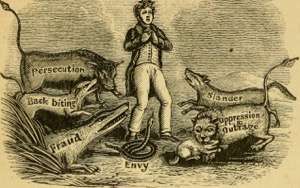Researchers look workplace envy right in its green eyes

Envy can be a profound discomfort when another person gets what you want, but in the workplace it can also hinder an organization's productivity. In order to better understand the complexities of this silent constraint among co-workers, UC researchers are facing this green-eyed monster head-on.
Using two multicollaborative study models, researchers in UC's Lindner College of Business looked at the impact envy has on an organization –– based not only on the behaviors of the person feeling envy, but also how that dynamic changes the behavior of the person being envied.
According to Joel Koopman, UC assistant professor of management, envy can lurk in an office from a sense of injustice –– from an employee feeling they were treated unfairly in contrast to how a co-worker was treated by a superior. In that situation, Koopman found two distinct differences in how most employees work through uncomfortable situations depending on what he calls their baseline level of "epistemic motivation" –– the desire to process information thoroughly and grasp the meaning behind the circumstance that has elicited their emotions, in this case, envy.
People with low levels of epistemic motivation typically pigeonhole most situations into general categories without analyzing every circumstance. Those with higher levels of such motivation, however, are much more sensitive to nuance, and attend to detail and work well with negotiations and in creative environments.
But in this case Koopman says high epistemic motivation can come with a cost.
In a paper presentation at the 76th annual meeting of the Academy of Management (AOM) this month in Anaheim, California, titled, "My Coworkers are Treated Fairer than Me! The Depleting Effects of Justice Social Comparison Perceptions and Envy," Koopman found that the level of epistemic motivation in the envious person had a direct impact on how well that outcome played out in a couple of different ways.
On the flip side of the envy conundrum, Harshad Puranik, UC doctoral student in the College of Business, presented similar research at the AOM titled, "They Want What I've Got: The Role of Self-Esteem and Attribution in Determining Responses to Coworker Envy," but in his model Puranik looked instead at the behavioral responses evoked by the person being envied.
In his collaborative research with Koopman and Heather Vough, UC assistant professor of management, Puranik unravels a similar dichotomy of responses by the person being envied that depends on a high or low level of what he calls their "trait self-esteem."
The caveat here is that the envied person's response depends on not only their own self-esteem, but also whether the envious behaviors toward them were hostile or not.
Both Koopman and Puranik's study models highlight how different people will handle these situations very differently depending on their trait self-esteem and epistemic motivation levels. The UC researchers look forward to designing future study models that will help shed light on how to effectively manage and mitigate these emotional hurdles in the workplace.
Provided by University of Cincinnati
















